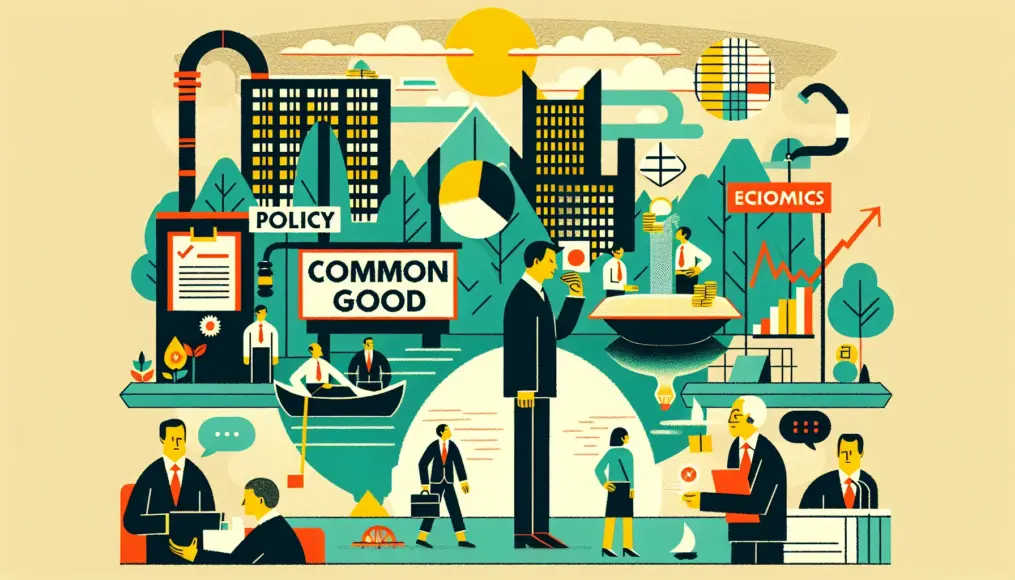Thinking about the common good is a crucial step toward improving our society. In today’s world, how do we understand and realize this concept? The theme of the common good is intricately tied to our lives and policies, extending beyond mere theory to illuminate the challenges we face through social change and ethical discussions.
In this article, we will delve into the concept of the common good, exploring its historical background and modern definitions. We will also examine its relationship with policy-making and consider practical ways to achieve it. It’s essential for us to reflect on how we can balance individual freedoms with the collective interests of society. What approaches are necessary to truly realize the common good?
- An overview of the historical context and modern definitions of the common good
- Ethical considerations in policy-making
- Practical approaches to achieving the common good
What is the Common Good?
The concept of the common good is a vital idea aimed at pursuing the happiness and welfare of society as a whole. This notion has roots that stretch back to ancient times, taking on various forms across different cultures and eras. Even in today’s world, the common good plays a significant role in our lives and policies, with its importance being reaffirmed through ethical discussions and societal changes.
In this chapter, we will reflect on the historical background of the common good while considering its definition in contemporary society. Exploring how this concept has developed and how it influences our lives today is essential for building a better future.
Historical Insights
The common good was first widely discussed by philosophers in ancient Greece. Aristotle believed that the purpose of the state is to create conditions for a “good life.” This perspective laid the groundwork for pursuing the collective benefit of society, playing a crucial role in politics and ethics. As time progressed, the concept of the common good evolved alongside the development of democracy and human rights, leaving its mark on modern political theory.
In the modern era, the common good has become increasingly significant in government policies and societal structures. It is recognized that achieving the common good requires balancing individual freedoms and rights, leading to the examination of various policies. As a result, the common good has transformed from a mere ideal into a concrete approach for addressing real societal issues.
- The common good is an important concept dating back to ancient times
- Aristotle’s ideas form the foundation of this concept
- Influence on modern policy
Definition in Contemporary Society
Today, the common good is defined from multiple perspectives. While prioritizing the interests of society as a whole is essential, it is equally important to respect individual rights and freedoms. Striking this balance presents a significant challenge in realizing the common good. Furthermore, the common good is related to concrete policy issues, such as education, environmental concerns, and poverty alleviation.
Moreover, the common good is deeply intertwined with civic engagement. When citizens actively participate in society and express their opinions, they contribute to building a better community. Thus, the definition of the common good in modern society has evolved beyond merely implementing policies; it now emphasizes the involvement of individuals and communities.
- The common good prioritizes the interests of society as a whole
- Balancing individual rights is crucial
- Civic engagement contributes to achieving the common good
The Connection Between the Common Good and Policy
The concept of the common good is fundamental to pursuing the overall benefit of society, and policies play a crucial role in achieving it. In the policy-making process, considering the common good is essential, encompassing various ethical aspects. Furthermore, there’s a deep connection with economic policies, as a range of strategies is necessary to realize the common good. In this chapter, we will delve into the relationship between the common good and policy.
To realize the common good, ethical considerations in policy-making are indispensable. The way policies are implemented can significantly impact society. Therefore, policymakers need to make decisions with the common good in mind. By adopting an ethical perspective, they can craft policies that consider the interests of a broader group of people, ultimately contributing to the happiness of society as a whole.
Ethical Considerations in Policy-Making
Policy decisions involve various stakeholders, which can lead to conflicts of opinion and interests. Thus, ethical considerations are vital for achieving the common good. Policymakers are expected to consider the rights and interests of all citizens, striving for fairness in their policies.
Moreover, incorporating ethical considerations enhances the transparency and reliability of policies. When citizens find it easier to engage with policy-making, it ensures accountability throughout the implementation process. This, in turn, makes it easier to realize the common good.
- Various stakeholders are involved in policy decision-making
- Policies must aim for fairness
- Transparency and reliability of policies improve
The Connection to Economic Policies
The common good is closely intertwined with economic policies. The design and implementation of these policies can significantly affect the overall welfare and living standards of society. To pursue the common good, it is essential that economic policies work to reduce poverty and inequality while providing equal opportunities for all citizens.
Additionally, striving for sustainable economic growth is also part of the common good. By implementing economic policies that consider environmental protection and proper resource management, we can fulfill our responsibilities to future generations. In this way, economic policies become a vital tool for realizing the common good.
- Economic policies affect the welfare of society
- There is a need to reduce poverty and inequality
- Sustainable economic growth contributes to the common good
Challenges in Achieving the Public Good
Achieving the public good involves navigating several significant challenges. These obstacles become particularly critical in situations where there’s a need to balance the collective interests of society with individual rights and freedoms. The difficulty of forming social consensus and maintaining a balance with personal liberties can often hinder progress toward the public good. In this chapter, we’ll delve deeper into these challenges.
To begin with, the complexity of forming social consensus is especially evident in our diverse modern society, where a multitude of values and opinions intersect. With people from various backgrounds coming together, finding common goals can be a daunting task. Conflicts of opinion and competing interests can make it difficult to reach an agreement necessary for achieving the public good.
The Difficulty of Forming Social Consensus
For the public good to be realized, it’s essential for society to move in the same direction. However, the reality is that a variety of opinions and values exist, making consensus-building a challenge. Particularly when groups with differing interests are in conflict, the process of reaching an agreement can be prolonged. Additionally, information imbalances and misunderstandings can further complicate consensus formation.
Dialogue and discussion are essential components of this process, but they don’t always function effectively. Creating an environment where citizens can easily participate is a crucial step toward realizing the public good.
- Consensus-building requires the adjustment of diverse values
- Conflicting interests complicate the process of reaching agreement
- Citizen participation is a vital step
Balancing Individual Freedoms
In the pursuit of the public good, it’s also vital to respect individual freedoms. It is unacceptable for personal rights to be infringed upon in the name of public interests. Thus, finding the right balance between the public good and individual liberties becomes a significant challenge in policy and legal design.
For instance, policies aimed at environmental protection may impose restrictions on personal lifestyles. In such cases, it is necessary to discuss the extent to which individual freedoms can be limited. To achieve the public good, we must draw appropriate boundaries between personal freedoms and collective interests, ensuring a harmonious coexistence.
- Respecting individual freedoms is crucial
- Balancing the public good and individual rights presents challenges
- Appropriate boundaries are needed to achieve harmony
Concrete Approaches to Achieving the Common Good
What specific approaches are needed to achieve the common good? Education and citizen participation are vital components in this pursuit. By raising awareness through education and encouraging involvement in various activities, we can lay the groundwork for realizing the common good. In this section, we will explore these concrete approaches.
Education serves as a fundamental means of achieving the common good. Educated citizens come to understand their rights and responsibilities, developing a sense of accountability toward society. Moreover, as ethical values and social consciousness are nurtured through education, actions that promote the common good become more prevalent. Therefore, the role of education is incredibly important.
The Role and Importance of Education
Education forms the foundation for realizing the common good. When citizens comprehend what the common good entails, they are more likely to engage in responsible behavior. Notably, ethics education and social studies are essential for instilling an appreciation for the importance of the common good. This awareness encourages individuals to reflect on how their actions impact the broader community.
Furthermore, education aids in understanding diverse opinions and values. Engaging in dialogue with people from different backgrounds fosters a shared understanding, making it easier to form a consensus around the common good. In this way, education becomes a crucial approach to achieving the common good.
- Education nurtures a sense of responsibility in citizens
- Actions that promote the common good are encouraged
- Helps in understanding diverse values
Promoting Citizen Participation
Citizen participation is an indispensable element in realizing the common good. When citizens express their opinions and engage in decision-making processes, it becomes possible to build a better society. To encourage citizen participation, providing transparency of information and creating spaces for dialogue are essential.
Additionally, involvement in local community activities and volunteering is one way citizens can contribute to the common good. This engagement helps to identify community needs, leading to more effective policies and services. When citizens actively participate, the realization of the common good becomes more attainable.
- Citizen participation is essential for the common good
- Expressing opinions enables social contribution
- Community activities and volunteering play a crucial role
Conclusion
The concept of the common good is crucial for improving our society, and our understanding of it deepens through its historical context and its relevance to contemporary policies. Achieving the common good requires a strong emphasis on education and the encouragement of civic participation. These approaches lay the groundwork for citizens to become aware of the common good and to act toward shared goals.
Moreover, the pursuit of the common good comes with challenges, such as balancing social consensus with individual freedoms. By addressing these challenges, we can work towards a more sustainable and equitable society. Ultimately, I believe that our efforts to realize the common good will contribute to the well-being of everyone.
- The common good is an essential concept for improving society.
- Education and civic participation are vital for achieving the common good.
- Tackling challenges can lead to a sustainable society.
Efforts toward the common good begin with each of our individual awareness. I invite you to share your thoughts and opinions in the comments section below.



Comment